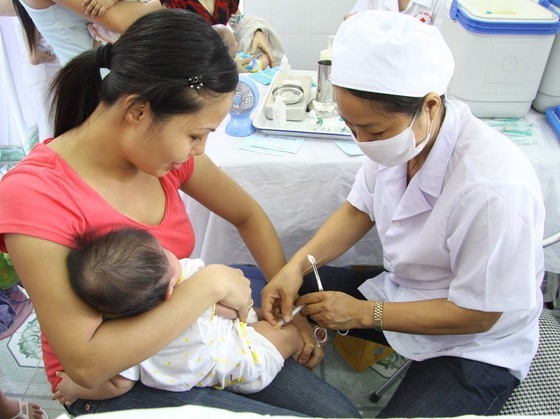 |
HCMC needs over 1.7 million vaccine doses for the expanded program on immunization |
In its submission to the municipal People's Committee on the demand for vaccines in the expanded program on immunization, the Department of Health announced it has reviewed the need for various kinds of vaccine this year and the half of 2024, at least 1.7 million vaccine doses.
Amongst them, the city needs 121,700 doses and 126,240 doses of oral polio vaccine in 2023 and in the first 6 months of 2024, respectively.
The city also needs 110,668 doses and 73,842 doses of vaccine DPT-VGB-HiB against 5 diseases including diphtheria, pertussis, tetanus, hepatitis B, pneumonia / pyogenic meningitis caused by Hib bacteria for 2023 and the first 6 months of 2024, respectively.
According to the Department of Health of Ho Chi Minh City, the review and report on the demand for vaccines in the program is related to the Government's Resolution 98 on using the state budget in 2023 for the purchase of vaccines in the expanded program on immunization. Accordingly, people's committees in provinces and cities were assigned to review and report their needs to the Ministry of Health.
From 2022, the shortage of vaccines in the expanded program on immunization took place in Ho Chi Minh City. Worse, the lack of vaccines was later seen in all provinces countrywide. Therefore , the health sector in the southern largest city has sent many reports on the shortage of vaccines, requesting to provide additional vaccines to meet the demand.
Last May, the Department of Health of Ho Chi Minh City ran out of some vaccines in the expanded program on immunization while medical clinics in the city strived to maintain regular operations according to fixed schedules. Medical workers administered injections of existing vaccines and made a list of children who had not been vaccinated as per their schedule so that the facilities would inject them later when vaccines were allocated.
Worse, by the beginning of June, the Ministry of Health said that it had received reports from 16 provinces and cities on some problems, including the allocation of local funds, reference to procurement prices and implementation methods when implementing the procurement of vaccines for the program. Localities proposed the Ministry of Health conduct centralized bidding, place orders or negotiate prices of vaccines in the program.
However, the Ministry of Health said that according to the Bidding Law, this agency is currently unable to carry out procurement in the form of national centralized bidding or procurement for domestically produced vaccines.
Therefore, to meet urgent vaccine requirements, the Ministry of Health proposed to the Government to issue a Resolution to allow using the local budget for the implementation of vaccine procurement for the program.
























